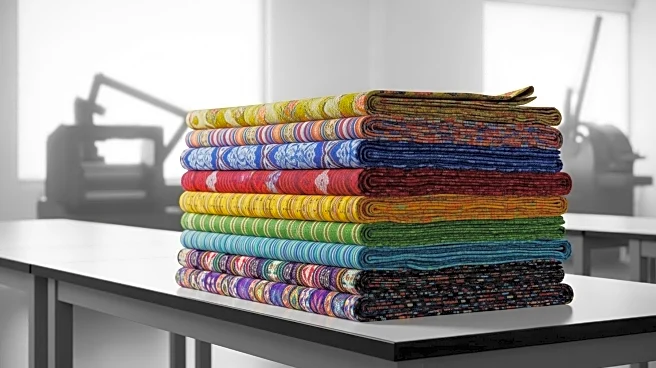What is the story about?
What's Happening?
The textile industry in Tiruppur, India, is facing significant challenges due to tariffs imposed by President Trump on Indian exports. These tariffs, which were increased by 50% in retaliation for India's purchase of Russian oil, have led to a drastic reduction in business with the U.S., with some companies experiencing an 80% drop in orders. The city of Tiruppur, known for its strong ties to the U.S. market, is particularly affected, with local businesses struggling to maintain operations. The tariffs have resulted in layoffs and forced companies to seek new markets in Europe, although these markets cannot replace the U.S. in terms of purchasing power.
Why It's Important?
The tariffs imposed by President Trump have significant implications for the Indian textile industry, which exports billions of dollars worth of products annually. The increased tariffs threaten up to three million jobs in Tamil Nadu's textile sector, highlighting the broader economic impact on the region. The situation underscores the vulnerability of industries reliant on international trade and the potential consequences of geopolitical decisions. The tariffs have forced companies to offer significant discounts to maintain relationships with U.S. buyers, but without government support, the industry may face severe financial difficulties.
What's Next?
The Indian textile industry is seeking financial support from the government to withstand the impact of the tariffs. Companies are exploring new markets in Europe, but the transition is challenging due to the established reliance on U.S. trade. The industry is hopeful for a potential bilateral trade agreement that could alleviate the situation. However, without swift action, the industry may face further layoffs and closures, exacerbating the economic challenges in the region.
Beyond the Headlines
The tariffs highlight the complex interplay between international trade policies and local economies. The situation in Tiruppur reflects the broader challenges faced by industries in developing countries when geopolitical tensions arise. The reliance on U.S. markets has left the Indian textile industry vulnerable, and the tariffs serve as a reminder of the need for diversification in trade partnerships to mitigate such risks.
















